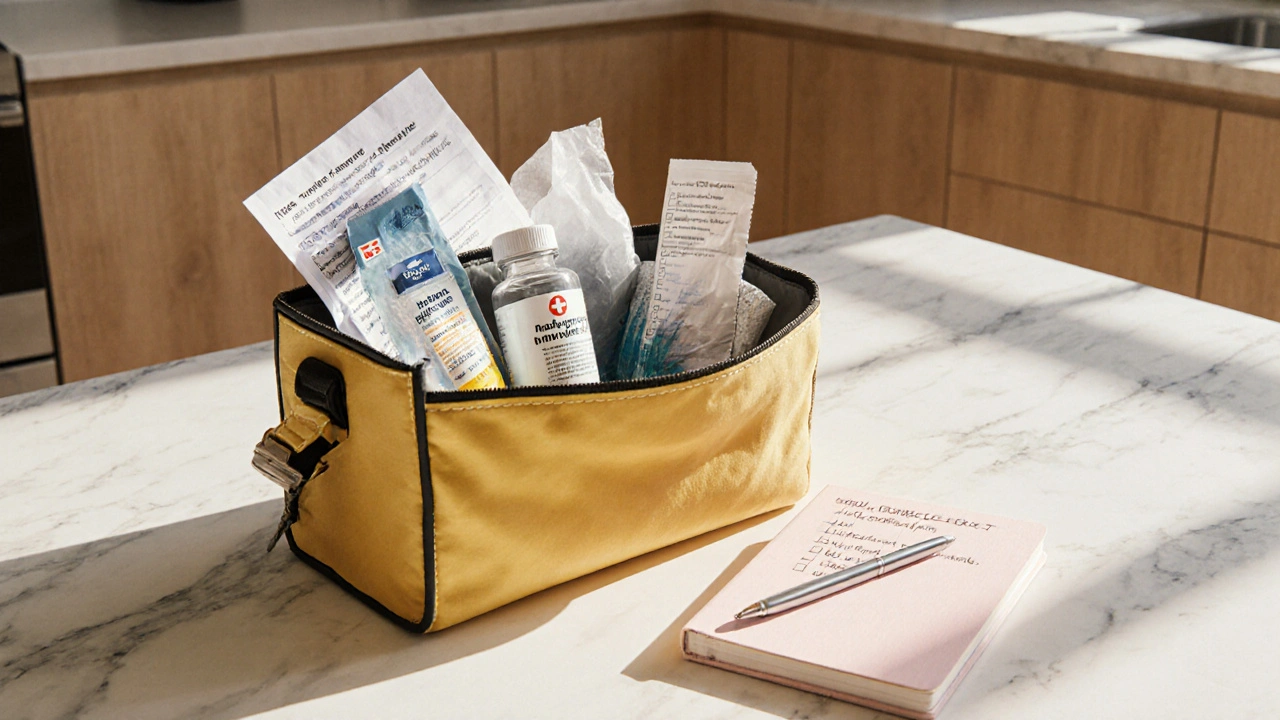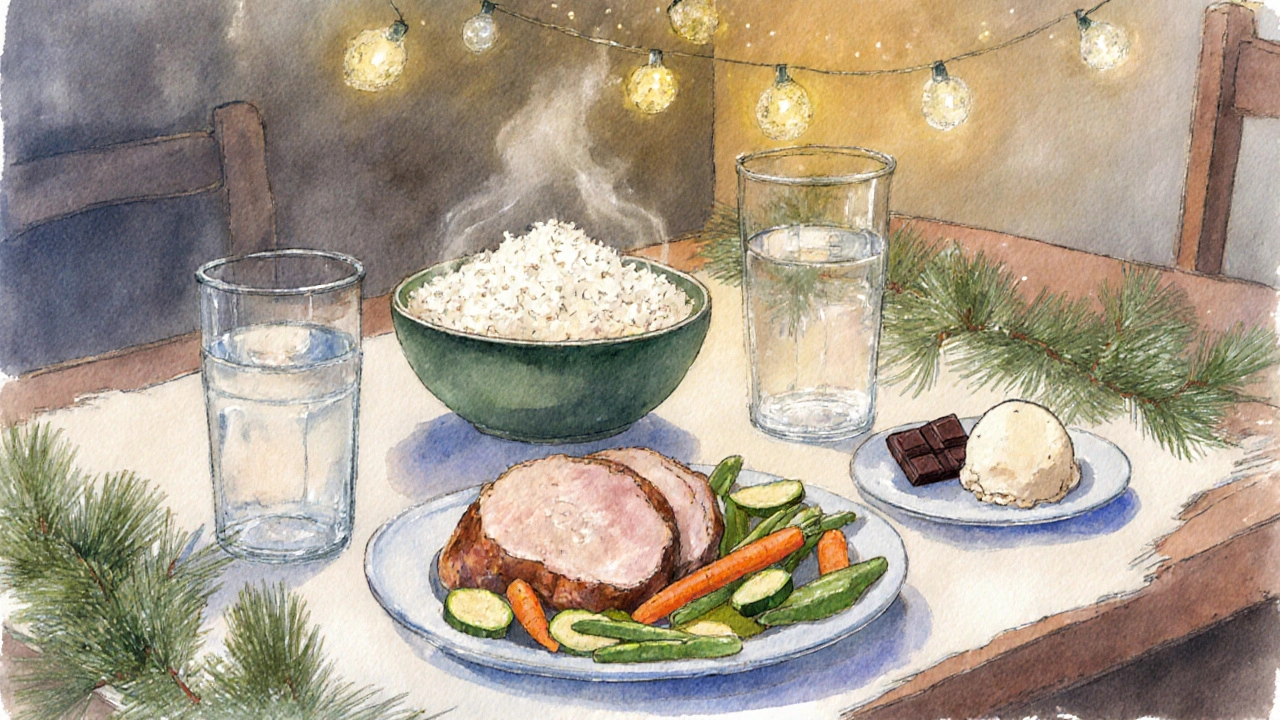Managing Colitis Symptoms During the Holidays: Practical Tips

Holiday Colitis Management Planner
Medication & Supply Checklist
Track your medication schedule and emergency supplies:
Emergency Kit Items
Items to pack for unexpected situations:
Hydration Tracker
Track your daily water intake:
Stress Relief Techniques
Quick stress relief methods for holiday chaos:
Low-FODMAP Holiday Food Guide
| Food Category | Low-FODMAP Options | Portion Tip |
|---|---|---|
| Proteins | Turkey, roast chicken, ham (no honey glaze) | 3-4 oz per serving |
| Starches | White rice, quinoa, plain potatoes | ½ cup cooked |
| Vegetables | Carrots, zucchini, spinach, green beans | ¼ cup cooked |
| Desserts | Lactose-free ice cream, dark chocolate (≤30 g), rice pudding (made with lactose-free milk) | One small scoop or piece |
Tip: Pair meals with water instead of soda or alcohol to prevent increased gut motility.
Quick Takeaways
- Map out medication times before the holidays start.
- Stick to low‑FODMAP foods and keep a simple snack list handy.
- Stay hydrated-aim for at least 2liters of water a day.
- Use short stress‑relief breaks (breathing, walk, music) between festivities.
- Pack an emergency kit with meds, a spare outfit, and a note for caregivers.
The holiday season brings extra meals, travel, and stress-exactly the kind of triggers that can flare colitis symptoms. The good news is you can still enjoy family gatherings and celebrations without feeling sidelined. Below is a step‑by‑step guide that helps you plan food, meds, and stress‑management so the holidays stay joyful rather than painful.
What Makes the Holidays Tricky for Colitis?
When you read about Colitis is a chronic inflammation of the colon that causes abdominal pain, diarrhea, and urgency. It’s part of the broader group called Inflammatory Bowel Disease (IBD) which also includes Crohn’s disease.
Three common holiday hurdles:
- Rich, fatty foods - holiday roasts, gravy, pies, and cheesy dips can irritate the gut.
- Unpredictable schedules - late‑night parties and travel can mess up medication timing.
- Stress spikes - buying gifts, family dynamics, and crowded events raise cortisol, which can worsen inflammation.
Knowing the why helps you target the how.
Medication & Supply Checklist
Missing a dose can turn a mild flare into a night‑time sprint to the bathroom. Create a simple calendar and a travel‑ready kit.
- Write down every prescription (5‑ASA, immunomodulators, biologics) with exact dosing times.
- Set phone alarms that repeat on travel days, accounting for time‑zone changes.
- Pack an Emergency Kit containing:
- Current meds (including rescue antispasmodics).
- Hydration salts or oral rehydration packets.
- Small trash bag for accidental leaks.
- Copy of your latest colonoscopy report for quick reference.
- Ask your doctor for a short‑term prescription of Antispasmodic Medication that you can keep handy for sudden cramps.
Keeping a printed copy of your medication list in your wallet or phone notes helps if you need urgent care while away.
Choosing Safe Holiday Foods
The low‑FODMAP diet is the most evidence‑based eating plan for IBD flare prevention. FODMAPs are short‑chain carbs that ferment in the gut and can trigger gas, bloating, and diarrhea. Below is a quick reference you can pull out at a buffet.
| Food Category | Low‑FODMAP Options | Portion Tip |
|---|---|---|
| Proteins | Turkey, roast chicken, ham (no honey glaze) | 3‑4oz per serving |
| Starches | d>White rice, quinoa, plain potatoes½ cup cooked | |
| Vegetables | Carrots, zucchini, spinach, green beans | ¼ cup cooked |
| Desserts | Lactose‑free ice cream, dark chocolate (≤30g), rice pudding (made with lactose‑free milk) | One small scoop or piece |
Pair each plate with a glass of water, not soda or alcohol, which can increase gut motility.
Adding Probiotics (e.g., Lactobacillusrhamnosus GG) may help maintain a balanced microbiome during indulgent meals. Look for a daily dose of at least 10billion CFU.

Hydration: The Unsung Hero
Diarrhea can quickly dehydrate you, especially if you’re drinking more coffee or alcohol than usual. Aim for 2‑2.5L of water daily; sip constantly rather than gulping. If you’re sweating from dancing or walking, add a pinch of salt and a squeeze of lemon to your water for electrolytes.
Stress Management Techniques That Fit Holiday Chaos
Stress isn’t just an emotional thing-it triggers cortisol spikes that can inflame the colon. Simple practices fit into any party timeline.
- 5‑minute breathing box: Inhale 4seconds, hold 4, exhale 4, hold 4. Repeat for two minutes before a big meal.
- Micro‑walks: Step outside for a quick 5‑minute stroll after every major course.
- Music reset: Play a favorite calming song for the duration of the dessert to reset heart rate.
These tricks are part of a broader Stress Management plan that cuts flare risk without sacrificing fun.
Staying Active Without Overdoing It
Gentle movement keeps bowel motility regular. Consider these holiday‑friendly options:
- Light yoga in the living room while watching holiday movies.
- Parking farther from the venue and walking the extra blocks.
- Using a standing desk for a few minutes while wrapping gifts.
Avoid heavy lifting or sprinting, which can jab the gut and raise pain levels.
When a Flare Happens: Immediate Action Plan
Even with the best prep, a surprise flare can strike. Follow this three‑step response:
- Stop eating - give the gut a break; sip water or a rehydration solution.
- Take rescue meds - use the antispasmodic you packed, then follow up with your prescribed rescue steroid if prescribed.
- Assess severity - if you have fever, blood in stool, or cannot keep fluids down, seek urgent care. Show the doctor your emergency kit note.
Having a clear plan reduces panic, which in turn lowers cortisol and helps the flare settle faster.
Sample Holiday Day Schedule
Putting everything together gives you a realistic picture of a day that balances celebration and colitis care.
- 07:00 - Wake, take morning dose of 5‑ASA with a glass of water.
- 08:00 - Light breakfast: low‑FODMAP oatmeal (gluten‑free) + lactose‑free yogurt + probiotic capsule.
- 10:00 - 5‑minute breathing box before heading out.
- 12:00 - Lunch at family home: turkey breast, white rice, carrots. Sip water, avoid sauces.
- 13:30 - Short walk around the block (10min).
- 15:00 - Small snack: rice crackers + a handful of almonds (≤10g). Take rescue antispasmodic if cramping starts.
- 17:00 - Evening medication reminder (set alarm).
- 18:30 - Dinner party: grilled salmon, quinoa, green beans. Limit alcohol to one glass of dry wine.
- 20:00 - 5‑minute music reset while dessert is served (low‑FODMAP dark chocolate).
- 22:00 - Finish water intake, prepare emergency kit for next day.
Adjust timings to your own routine, but keep the core principles: meds on time, low‑FODMAP meals, hydration, and micro‑stress breaks.

Frequently Asked Questions
Can I eat turkey stuffing during the holidays?
Most traditional stuffings contain onion, garlic, and wheat - high‑FODMAP ingredients. If you crave it, try a low‑FODMAP version made with chives, gluten‑free bread, and a drizzle of olive oil. Keep the portion small (about ¼ cup).
Is it safe to skip a medication dose because I’m traveling?
Skipping doses can lead to a flare. Set multiple alarms on your phone, and keep meds in a carry‑on bag. If you miss a dose by less than 2hours, take it as soon as you remember. If more time has passed, follow your doctor’s specific catch‑up instructions.
What beverages should I avoid at holiday parties?
Carbonated sodas, high‑sugar cocktails, and caffeinated drinks can increase gut irritation. Stick to still water, herbal teas (peppermint, ginger), and if you drink alcohol, choose a small amount of dry wine or clear spirits mixed with water.
How do I know when a flare needs emergency care?
Seek urgent care if you experience fever, blood in stool, severe abdominal pain that doesn’t improve after rescue meds, or inability to keep fluids down for more than 12hours. Bring your medication list and recent lab results.
Do probiotics really help during the holidays?
Clinical studies show that specific strains, like Lactobacillusrhamnosus GG, can reduce the frequency of mild flares when taken daily. Choose a product with at least 10billion CFU and start a few weeks before the holiday season for best results.

Sarah Pearce
October 4, 2025 AT 03:31Water > soda!!! Stay hydrated!!!
Rebecca Ebstein
October 4, 2025 AT 08:40Grab that holiday planner and actually write down every med dose before you even step out the door. It sounds simple, but having a printed schedule in your pocket saves a ton of panic when the turkey is burning. I swear, a quick 5‑minute breathing box before you head to the party can keep cortisol in check. Keep a spare bottle of electrolyte tabs in your bag, you’ll thank yourself later.
Artie Alex
October 4, 2025 AT 12:50The physiological ramifications of holiday‑induced stress on the colonic mucosa are, in my professional estimation, vastly underestimated by the lay public. When adrenergic surges coincide with irregular administration of 5‑ASA compounds, the bioavailability of the anti‑inflammatory agent can precipitously decline. Moreover, the osmotic load introduced by sugary cocktails exerts a hyperosmolar effect that precipitates luminal water shifts, thereby exacerbating diarrheal output. It is incumbent upon the patient to synchronize pharmacokinetic windows with circadian rhythms, a principle well‑documented in chronotherapy literature. The checklist methodology proposed herein, albeit pedagogically sound, suffers from an overreliance on user compliance without accounting for cognitive load during familial gatherings. One might argue that the inclusion of a digital alarm system, integrated with a cloud‑based medication reminder app, would mitigate this compliance gap. Additionally, the recommendation to ingest low‑FODMAP proteins such as turkey is scientifically valid, yet the omission of portion timing relative to immunomodulator peak plasma levels is a notable lacuna. From a gastroenterological perspective, the transient elevation of cortisol triggers mast cell degranulation, which in turn amplifies mucosal inflammation. Consequently, the micro‑walk strategy, while ergonomically feasible, may inadvertently introduce mechanical strain if performed in a congested venue. A more nuanced approach would entail scheduled, low‑impact ambulation in a controlled environment, such as a quiet hallway. The emergency kit itemization is comprehensive; however, the lack of a pre‑filled oral rehydration solution with precise electrolyte concentrations could compromise rapid therapeutic response. Clinical guidelines advocate for a sodium concentration of 90 mmol/L and potassium of 20 mmol/L in acute diarrheal states, a specification absent from the current template. In terms of probiotic adjuncts, the exclusive endorsement of Lactobacillus rhamnosus GG neglects the emerging evidence supporting multi‑strain formulations that include Bifidobacterium infantis. The author’s suggested water intake goal of 2 – 2.5 L, while commendable, fails to consider individual variability in renal function and baseline fluid status. Ultimately, the holistic management plan presented is a commendable scaffold, yet it requires iterative refinement to align with evidence‑based practice standards. Future iterations could benefit from integrating patient‑reported outcome measures to dynamically tailor the regimen to real‑world fluctuations in symptom severity.
Daisy Aguirre
October 4, 2025 AT 17:00I love the festive vibe of this guide – it feels like a holiday cheat sheet for our guts! Adding a splash of cranberry sauce (low‑FODMAP version) can make the turkey even more exciting. Remember, the most important thing is to enjoy the moments with family, not just the food. Keep the stress‑relief tricks handy and you’ll glide through the feast like a pro.
Sandy Gold
October 4, 2025 AT 21:10Honestly, the whole low‑FODMAP hype is a bit overblown for most people. You can tolerate a bit of garlic if you pair it with a protein, so don’t ban everything. Also, the planner assumes you have endless free time to check boxes, which is unrealistic during holiday chaos. A more realistic approach would be to focus on the most problematic triggers rather than every single ingredient. In the end, flexibility beats rigidity.
Frank Pennetti
October 5, 2025 AT 01:20This guide sounds good on paper but it’s just another generic health fad. Real American families need simple rules, not endless checklists.
Adam Baxter
October 5, 2025 AT 05:30You’ve got this – stay on track and enjoy the holidays!
Keri Henderson
October 5, 2025 AT 09:40Absolutely, staying motivated is half the battle; keep a small water bottle in your bag and sip every 20 minutes to prevent dehydration. Consistency beats occasional bursts of effort every time.
elvin casimir
October 5, 2025 AT 13:50While the content is helpful, I can’t help noticing the inconsistent use of hyphens – “low‑FODMAP” should be hyphenated throughout, and “re‑hydration” is a misspelling. Also, the bullet points mix plural and singular verbs, which is grammatically incorrect.
Steve Batancs
October 5, 2025 AT 18:00Your observations regarding editorial consistency are duly noted; ensuring uniform terminology will indeed enhance the professional presentation of the guide.